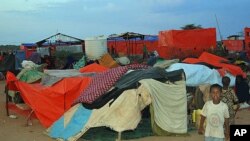The U.N. refugee agency is reporting high levels of malnutrition among young children in Ethiopia’s Dollo Ado camps, which are home to tens of thousands of Somali refugees. The UNHCR says a nutrition survey at the Kobe and Hilaweyn camps found Somali refugee children under age five in a critical state.
International attention to the crisis in the Horn of Africa seems to have peaked. But, according to the United Nations, the crisis itself is still going strong. It says more than 12 million people continue to be affected by the worst drought to hit the region in 60 years. Of those, people in Somalia, who are suffering from both famine and conflict, are hit the hardest.
UNHCR spokesman Andrej Mahecic says the number of Somalis seeking refuge in Ethiopia and Kenya has tapered off recently. But much of this, he says, is due to the fighting and the heavy rains in southern Somalia, which are making it difficult for people to move.
Nonetheless, he says between 170 and 200 people a day are arriving in both Kenya and Ethiopia.
"The problem is that the people who are arriving now are again very exhausted and in extremely dire condition. The sad evidence of that are their stories, of their basically losing the most vulnerable, the youngest among them en route to either Kenya or to Ethiopia," Mahecic said.
While only the strongest children make it alive to the refugee camps, the nutrition survey at the Kobe and Hilaweyn camps confirms the desperate state in which they arrive.
Mahecic says health and nutrition programs have been set up to treat severely malnourished children, especially the youngest. But the survey, he says, confirms that progress in bringing these children back to good health is slow.
"However, the number of deaths among the children under five has decreased dramatically compared to the very high level seen at the height of the refugee influx this summer. This reflects improved access to quality health care and nutrition services, as well as improved water and sanitation facilities. We are leading the coordination of a nutrition response to the survey’s findings," Mahecic said.
He says bad weather conditions are hampering the provision of aid. Mahecic adds that intermittent downpours in Dollo Ado are causing flash floods in the area. He says floods hit the local airstrip in the past four days, putting it out of service. As a consequence, relief supplies cannot be flown in.
Child Malnutrition Levels High in Ethiopia's Refugee Camps




